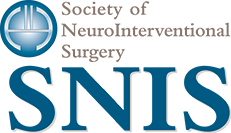CONTACT: Maria Enie, menie@vancomm.com
Recent Study Confirms Stroke Patients Are Significantly Delaying Treatment Amid Pandemic
FAIRFAX, Va. — With COVID-19 case numbers rising throughout Arizona, surgeons with the Get Ahead of Stroke campaign are warning residents that ignoring stroke symptoms out of fear of being exposed to coronavirus at a hospital increases their risk of disability or death.
Research published in the Journal of NeuroInterventional Surgery (JNIS) shows that ischemic stroke patients are arriving at hospitals and treatment centers an average of 160 minutes later during the COVID-19 pandemic, as compared with a similar timeframe in 2019. These delays, say stroke surgeons from the Society of NeuroInterventional Surgery (SNIS), are impacting both survival and recovery.
“As Arizona continues to see a spike in COVID-19 cases, fear of exposure is causing people to avoid seeking help for medical emergencies, but you can’t ignore a stroke,” said Dr. Felipe C. Albuquerque, a neurosurgeon at Phoenix’s Barrow Neurological Institute and SNIS board member. “This research suggests that patients are neglecting symptoms and delaying treatment, meaning they are either dying at home or arriving at stroke centers like ours too late to be helped.”
Under normal conditions, stroke is a leading cause of death and long-term disability. Nearly 800,000 people in the U.S. have a stroke every year, taking the lives of about 140,000 annually, and many more are left permanently disabled. Dr. Albuquerque says it is likely that the number of stroke-related deaths will increase in 2020 due to the pandemic, especially if patients continue to delay treatment and reach hospitals too late.
In the case of the most serious strokes — known as an emergent large vessel occlusion (ELVO) — up to two million brain cells die each minute. The longer a patient waits before they are treated, the greater the impact the stroke will have — potentially paralyzing them for life, or worse. Patients who arrive at the hospital quickly have the best chance to survive and recover their independence following a stroke. Dr. Albuquerque advises Arizonans to use the FAST method to assess any potential stroke symptoms: Facial drooping, Arm weakness, Speech difficulties and Time to call 911.
“Patients should know that stroke units in hospitals have implemented protocols to safeguard patients from COVID-19,” said Dr. Albuquerque. “What remains unchanged throughout this pandemic is that we still need to play it safe when it comes to stroke and always call 911. Avoiding or delaying treatment will only lead to more deaths.”
Get Ahead of Stroke is a national public education and advocacy campaign designed to improve systems of care for stroke patients. Founded in 2016 by the Society of NeuroInterventional Surgery (SNIS), the campaign is currently working with its partners to ensure that the COVID-19 pandemic does not deter stroke patients from getting the lifesaving care they deserve.

